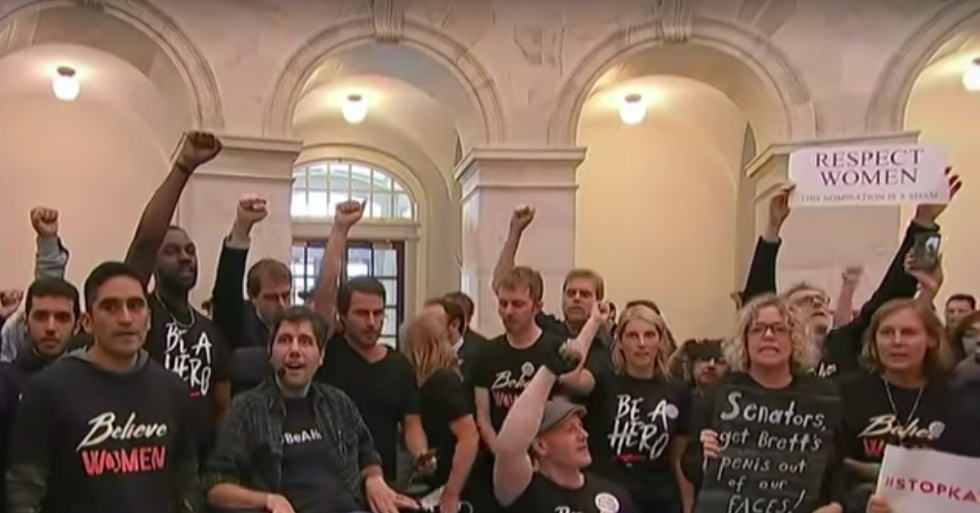The nation's eyes have been fixed on Brett Kavanaugh since he was nominated for the vacant Supreme Court seat in July. Unsurprisingly, the nomination caused a stir on the political left. An impending Republican majority on the Supreme Court provoked anxiety as to whether previous court decisions, particularly those involving marriage equality and reproductive freedom, would continue to be upheld.
Any scrutiny that had not previously been on Kavanaugh was attracted when Dr. Christine Blasey Ford came forth with allegations of sexual assault. She requested anonymity in her initial account of the experience, which she detailed in a letter to Senator Diane Feinstein, but her identity was soon revealed and the investigation kick into high gear.
It hasn't taken long for the case to settle in the political hot seat. Proponents of Kavanaugh seem to diverge two ways: either denying Ford's claims entirely or excusing Kavanaugh's behavior as typical of a high school boy, both with the goal of pushing him through to the Supreme Court. Meanwhile, the opposition is all too eager to use Ford as a catalyst to keep Kavanaugh out of the courtroom. Both sides clearly have ulterior motives, but the heart of the issue lies with the case's implications on women and victims of sexual violence.
Many of Kavanaugh's supporters began with what is often the immediate response to claims of sexual assault — outright denial. They cited the allegations as being politically motivated and went on to question why Ford hadn't reported the attack right away. It may seem that it boils down to her word against his, but as of now, the facts seem to be on Ford's side. Beyond the fact that Dr. Ford recounted her story under a polygraph test and passed, the chances of a false sexual assault report are minuscule, about 2%. Furthermore, the vast majority of sexual assaults go unreported entirely. It is not rare for survivors to come forth years or even decades after an attack, and with what backlash Ford and countless other women in her situation have endured, it's no wonder that this is the case. Either way, it's extremely disconcerting for women and girls to see sexual predators slide through the cracks of punishment and go on to attain success.
From the perspective of many women, Dr. Ford's case is yet another in a constant stream of sexual violence, and for many of us, it hits too close to home. If we ourselves haven't been assaulted, we know someone who has, and we rarely (if ever) see the assailant brought to justice. Of all rapes reported (a small number among all that take place), only about 20% are prosecuted, and of those, about one-third face jail time.
We consistently see public figures and celebrities accused of sexual misconduct, who nevertheless go on to thrive in their careers. Comedian Louis CK faced such allegations and was welcomed back by audiences after only a brief hiatus. Donald Trump himself was elected president despite his confirmed history of harassment and assault, amid a slew of disparaging remarks about women.
In the wake of numerous public figures being identified as rapists and sexual predators, women took to social media with the #MeToo movement. Countless former victims chimed in with their experiences of harassment and violence. However, despite the show of solidarity and momentary empowerment, little to no action was taken against perpetrators as a result. When victims of predatory behavior see these men being rewarded, how can we believe that the world is on our side? Assault survivors begin to reconsider reporting attacks, and transgressors continue to see their behavior as permissible. "Rape culture" is often disregarded as a feminist buzzword, but how can we deny it in the face of such damning evidence?
When it comes to Christine Ford and Brett Kavanaugh, we can hope that the truth will surface in due time. But even if the truth resides with Ford's allegations, it's impossible to know whether Kavanaugh will even have to answer for his behavior. It's disheartening for women to look at the future of the Supreme Court and face what we are seeing: a man accused of assault, nominated by a known sexual offender, potentially deciding on policies that affect women directly. The voices of victims are continually silenced in these matters. Even if we battle the social, legal and cultural barriers to reporting an assault, we are denied and slandered on the other side and we often end up seeing assailants walk free after all. It is perpetually exhausting to see sexual offenders and rapists continuously pardoned for their crimes and placed in positions of power. It's time we realize that we deserve better.

















